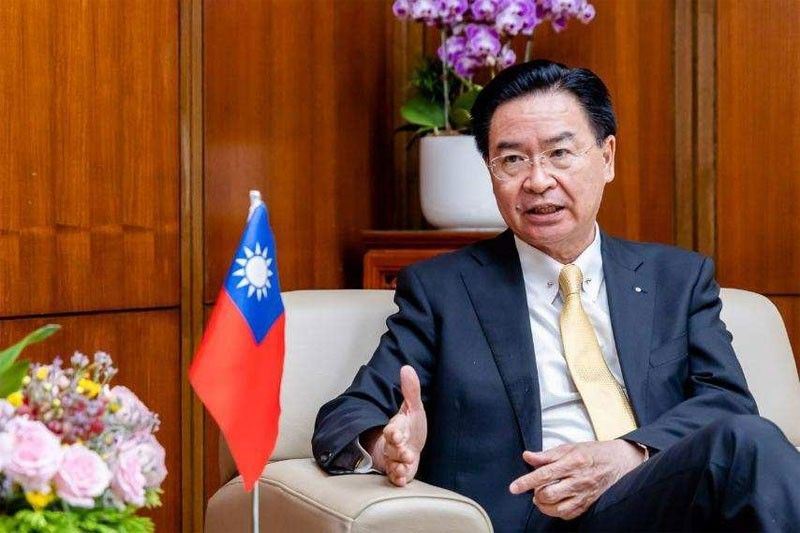Taiwan seeks security cooperation with Philippines

TAIPEI – With the Philippines and Taiwan facing the same threat, security cooperation may be possible between the two, Taiwanese Foreign Minister Jaushieh Joseph Wu said.
Wu said he could not go into details about possible security cooperation, but that “this is one area that we should think about.”
Another area, he said, is coast guard cooperation and disaster response.
Taiwan is optimistic of improved ties with the Philippines under President Marcos.
Wu told The STAR in an interview here Tuesday that his government welcomed US moves to strengthen the defense capabilities of the Philippines, such as setting up additional US military installations under the Enhanced Defense Cooperation Agreement (EDCA).
He brushed aside concerns that setting up the US military facilities under EDCA, two of which are in the northern Philippines just across the sea from Taiwan, is a provocative act directed at China.
“What is causing provocation in this region is China’s expansionism,” Wu said.
“As far as I can see, there are prospects for better relations between Taiwan and the Philippines under the current President BBM,” Wu said. “Some of his public statements concerning Taiwan have been welcomed by Taiwanese people. For example, he spoke about the importance of peace and stability in this area. He spoke about the need to oppose unilateral change of status quo in all these areas, including South China Sea.”
During Super Typhoon Yolanda, he said the Taiwan air force was able to deliver a planeload of relief goods in the Philippines before China exerted pressure, “and therefore we had to stop.”
Wu lamented that this is part of the “cognitive warfare” being waged by China against Taiwan – “saying that geopolitics these days is a conflict or dispute or competition between the United States and China. And therefore our countries should stay away from this conflict, countries should stay neutral.”
The cognitive warfare, he said, is in line with the “hybrid warfare” being waged by China against what it considers as its renegade province. Beijing has threatened to one day retake Taiwan, by force if necessary.
“They are threatening Taiwan, day in and day out, and initiating hybrid warfare,” Wu said. “Cyber attacks. Disinformation campaign. Infiltration. Or cognitive warfare. Things that are under the threshold of real gunfighting. So this is what China has been waging against Taiwan. And other than that there is also economic coercion.”
Wu stressed that Taipei is open to “peaceful dialogues” with Beijing, but the Chinese insist that the Taiwanese must accept the one-China, two-systems model of reunification – something that he said cannot be accepted if Hong Kong is the model.
At this point, Wu said, public opinion polls show that the Taiwanese simply want to maintain the status quo, which is that Taiwan “is an autonomous state.”
“To us, we are not run by China,” he said. “Taiwan runs by itself. We have a president, publicly elected. We have a parliament, publicly elected as well, and we have a Ministry of Foreign Affairs, we have a Ministry of National Defense and we even have an independent currency note, which is New Taiwan dollar. And therefore, Taiwan is not part of the PROC.”
He expressed hope that Chinese economic pressure would not be “overestimated” by the international community, noting that the massive investments promised by Beijing to the Philippines during the previous administration did not materialize.
“Of course we don’t want to impose,” Wu emphasized. “We hope the Philippine government can think through some of the things that will be in the interest of the Philippines.”
Taiwan had initiated the so-called nine-dash-line claim over the South China Sea. When the Permanent Court of Arbitration in The Hague invalidated the claim in 2016, Taipei pointed out that it could not comment on the ruling because it was not consulted or asked to participate in the arbitration. Taiwan’s position on the issue is unchanged.
“We support the rights of freedom of navigation and freedom of overflights,” Wu said.
He stressed that Taiwan does not want to be “a provocateur.”
“We don’t want to offend anyone. We don’t want to cause any conflict in this region,” he said, adding that Taipei simply wants to preserve the status quo with China and resolve disputes over the South China Sea through peaceful dialogue.
If China wages war on Taiwan, he noted, “who will be the next target? I think it might be the Philippines.”
“We think that the best way for us at this moment is for Taiwan and other claimants of the South China Sea to enter into peaceful research of the natural resources (in the sea) or engage in scientific endeavors together or jointly develop the resources,” he said.
“As far as I can see, there’s prospects for better relations between Taiwan and the Philippines under the current President BBM,” Wu said. “As long as there’s a desire on the part of the Philippines, Taiwan will be there to work together with the Philippines. After all, the Philippines is the closest neighbor to us.”
- Latest
- Trending






























